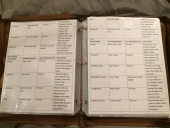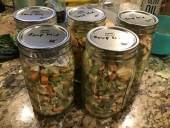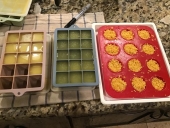My parents were poor for a long time. They lived in a 1 bedroom apartment with no toilet and only cold water. They lived there with two small children, until my grandfather died and we moved into their house together with my grandmother. After that their finances got better, but my mother was always very fugal about food. To feed us all my father would go fishing and hunting. The fish and meat was then preserved, some in salt, some smoked, some dried and some frozen. My mother together other women and children, would travel to the national parks where we would forage for mushrooms, chestnuts, rosehips, nuts, pine tips, pine cones, ferns, elderberries, blueberries and so many other things. Later meat was bought directly from the farmer, usually as a whole or half animal. My mother did the butchering herself.
Nothing went to waste in that household. To stretch ground meat, she would start by adding salt to the meat and mix it in. Then she would add ice cold water, which the meat sucked in because of the salt. This by itself added 50% more volume to the ground meat.
We used to get day old bread from the baker, who often didn’t charge anything for it. The best dread we would eat as is, the rest was dried and ground into breadcrumbs. The bakers leftover cakes and cookies, was mixed together with a little rum extract. Then it was shaped into balls. These were served with lunch or as a dessert. My parents also brewed their own beer and wine, which is how I learned how to do it.
They also grew a lot of vegetables and fruits, after they moved in with my grandmother.
This upbringing has definitely influenced how we live today. Despite all of this work, there was still times when we didn’t get enough to fill us up and I learned to eat food even when it made me sick. Food is not something that was wasted. For me having our homestead with food security, is the most important thing in my life. It simply makes me feel safe, not just knowing that we have enough to eat, but also that I have taught my children how to achieve food independence.
That said, fugal living wasn’t just about food. It was also about mending instead of trashing things, sewing our own clothes, knitting and crochet, and making our own tools. It is hard work, but it’s also honest important work.









